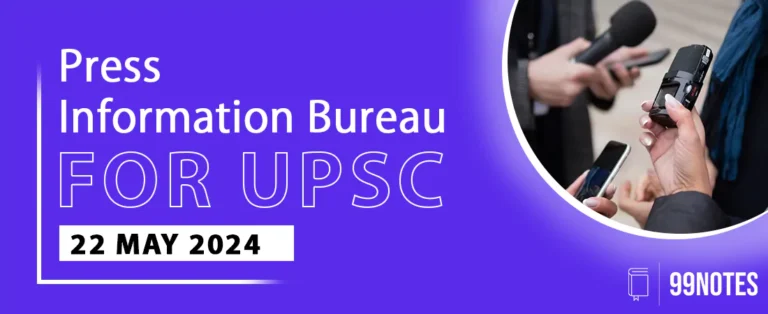28 March 2024 : PIB Summary for UPSC
PIB Summary for UPSC
28-March -2024
1. Government’s Borrowing plan for first half of FY 2024-25
|
Topic: GS2 – Indian Economy – Issues relating to mobilization of resources UPSC candidates must understand India’s fiscal policy, borrowing plans, and financial instruments to tackle economic and governance questions effectively. |
| Context |
| ● The Government of India, with the Reserve Bank of India, announces borrowing plans of ₹7.50 lakh crore for H1 FY 2024-25, including Sovereign Green Bonds. |
Additional information on this news:
- The Government of India, in consultation with the Reserve Bank of India, has finalized its borrowing programme for the first half (H1) of FY 2024-25.
- Out of the projected ₹14.13 lakh crore borrowing for FY 2024-25, ₹7.50 lakh crore (53.08%) will be borrowed in H1 through dated securities, including ₹12,000 crore through Sovereign Green Bonds (SGrBs).
- A new 15-year tenor dated security will be introduced.
- The gross market borrowing of ₹7.50 lakh crore will be completed through 26 weekly auctions spread over various maturities ranging from 3 to 50 years.
- The Government will carry out switching of securities to smoothen the redemption profile.
- A greenshoe option of up to ₹2,000 crore against each security in the auction notifications will be retained.
- Weekly borrowing through Treasury Bills in Q1 of FY 2024-25 is expected to be ₹27,000 crore for the first seven auctions and ₹22,000 crore for the subsequent six auctions with net borrowing of ₹(-)3,000 crore.
- The Ways and Mean Advances (WMA) limit for H1 of FY 2024-25 has been set at ₹1.50 lakh crore by the Reserve Bank of India.
| Government Borrowing: |
|
Pros: ● Stimulates Economic Growth: Government borrowing can inject funds into the economy, fuelling economic activities such as infrastructure projects, education, and healthcare, thereby stimulating growth. ●Crisis Management: During economic downturns or crises, borrowing allows governments to implement fiscal stimulus measures to mitigate the negative impacts, such as unemployment benefits or business support programs. ● Investment in Future Productivity: Borrowing for investments in education and research can enhance human capital and innovation, leading to long-term economic productivity gains. ● Infrastructure Development: Borrowed funds can be allocated to infrastructure projects, improving transportation networks, communication systems, and utilities, which can boost productivity and competitiveness. ●Fiscal Flexibility: Borrowing provides governments with flexibility in managing their budgets, allowing them to smooth out revenue shortfalls over time rather than implementing immediate austerity measures. Cons: ● Debt Servicing Costs: Borrowing leads to interest payments on the debt, diverting funds away from other essential public services or investments, and potentially burdening future generations with debt. ● Crowding Out Private Investment: High levels of government borrowing can lead to higher interest rates, crowding out private sector borrowing and investment, which may hinder economic growth in the long term. ● Risk of Default: Excessive borrowing can lead to unsustainable debt levels, increasing the risk of default or financial crises, which can have severe repercussions on the economy and financial markets. ● Inflationary Pressures: If borrowing leads to excessive money supply growth, it can fuel inflation, eroding the purchasing power of consumers and undermining economic stability. ●Dependency on Credit Markets: Reliance on borrowing exposes governments to fluctuations in credit markets, making them vulnerable to changes in investor confidence and interest rates. |
| Practice Question: Discuss the impact of government borrowing on the economy, highlighting both its advantages and disadvantages. Provide insights into how government borrowing can influence economic growth and stability. (150 Words /10 marks) |
2. Justice Ritu Raj Awasthi sworn in as judicial member, Lokpal of India.
|
Topic: GS2 – Indian Polity – Statutory Bodies Relevant for UPSC as it concerns appointments to Lokpal, a crucial anti-corruption institution in India’s governance framework. |
| Context |
| ● The news mentions appointment of new members to Lokpal, including Justice Ritu Raj Awasthi, Pankaj Kumar, and Ajay Tirkey. |
Additional information on this news:
- Justice Ritu Raj Awasthi, former Chairperson of the 22nd Law Commission of India, sworn in as Judicial Member of Lokpal.
- Shri Pankaj Kumar, ex-Chief Secretary of Gujarat, and Shri Ajay Tirkey, former Secretary of Department of Land Resources, appointed as Members of Lokpal.
- Outgoing members completed their tenure on March 26, 2024.
- Ceremony attended by Central Vigilance Commissioner and senior officials of CBI and ED.
| More about Lokpal of India |
|
● The Lokpal of India, established by the Lokpal and Lokayuktas Act, 2013, serves as an anti-corruption ombudsman. ● Comprising a Chairperson and a maximum of eight members, with at least 50% being judicial members, the Lokpal is appointed through a transparent process. ● Its jurisdiction covers the Prime Minister, Ministers, Members of Parliament, government officials, and employees of government-controlled organizations. ● Endowed with powers to inquire into corruption allegations against public officials, the Lokpal can recommend appropriate actions and initiate investigations based on complaints or suo motu. ● The Lokpal has its Investigation Wing for preliminary inquiries, with subsequent cases referred to investigative agencies for further action. ● In addition to recommending criminal proceedings, the Lokpal can suggest preventive measures and systemic reforms to curb corruption in public administration. ● Appeals against Lokpal decisions can be made to the Supreme Court. ● Challenges faced by the Lokpal include resource constraints and coordination issues with existing anti-corruption bodies. ● Despite challenges, the Lokpal signifies a crucial step in combating corruption, fostering transparency, and ensuring accountability in governance. |
|
PYQ: A national Lokpal, however strong it may be, cannot resolve the problems of immorality in public affairs’. Discuss. (200 words/10m) (UPSC CSE (M) GS-2 2013) |
|
Practice Question: In the context of the Lokpal of India, discuss its composition, jurisdiction, and powers. Highlight the significance of the Lokpal in addressing corruption and the challenges faced in its effective implementation. (250 Words /15 marks) |
For Enquiry

28 March 2024 : Daily Current Affairs

28 March 2024 : The Hindu Editorial Notes PDF

28 March 2024 : PIB Summary for UPSC

28 March 2024 : Indian Express Editorial Analysis

IAS Officers’ Salary, Perks & Allowance in 2024

27 Mar 2024 : Daily Answer Writing

27 Mar 2024 : Daily Current Affairs Quiz

27 March 2024 : Daily Current Affairs

27 March 2024 : Indian Express Editorial Analysis

27 March 2024 : PIB Summary for UPSC
Daily Current Affairs 28 March 2024 : Daily Current Affairs Daily Current Affairs
28-March -2024- Top News of the Day
1. India TB Report-2024: Missing cases shrinking,…
March – The Hindu Editorial 28 March 2024 : The Hindu Editorial Notes PDF The Hindu EDITORIAL
28-March-2024
1. WTO’s investment facilitation negotiations are not illegal
Topic:…
March 2024 PIB 28 March 2024 : PIB Summary for UPSC PIB Summary for UPSC
28-March -2024
1. Government’s Borrowing plan for first half of FY 2024-25
Topic:…
Indian Express 28 March 2024 : Indian Express Editorial Analysis Indian Express Editorial Analysis
28-March-2024
1. Holes in social security
Topic: GS2 – Governance…
Blogs Upsc IAS Officers’ Salary, Perks & Allowance in 2024 Topics Covered: IAS Salary, IAS Salary Per Month, Salary before & After 7th Pay commission, IAS Salary…
mains answer writing 27 Mar 2024 : Daily Answer Writing Mains Answer Writing
27-March-2024
Q1) Indian institutions of higher education feature low in international…
Daily Quiz 27 Mar 2024 : Daily Current Affairs Quiz 27 Mar 2024 : Daily Quiz…
Daily Current Affairs 27 March 2024 : Daily Current Affairs Daily Current Affairs
27-March -2024- Top News of the Day
1. Employment scenario in India grim, says…
Indian Express 27 March 2024 : Indian Express Editorial Analysis Indian Express Editorial Analysis
27-March-2024
1. Don’t blame it on wokeness
Topic: GS2 – Social Justice…
March 2024 PIB 27 March 2024 : PIB Summary for UPSC PIB Summary for UPSC
27-March -2024
1. As part of overseas deployment to ASEAN countries, ICG Ship Samudra…

